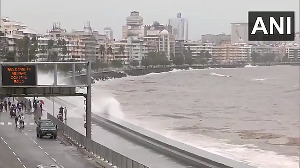The Army, according to highly placed sources, has already held three rounds of validation trials for the system in which British Aerospace subsidiary Selex Sensors and Airborne Systems, the French-German Thales and companies from South Africa and Israel have participated.
Selex and Thales have been shortlisted after three rounds of trials held in artillery ranges in the Thar Desert. The sources said the system was being inducted to have automated, accurate detection of artillery, mortar as well as rocket-fire faster than ever before.
The system uses sophisticated acoustic detection technology to identify enemy artillery fire as well as to locate sources of explosions and hostile firing, they said.
"Acquisition of fire-finding radars and new Sound Ranging System is part of the artillery upgradation programme," sources said. They said the fire finding radars acquired recently from the US as well as Sound Ranging Systems were complimentary and could be used in tandem or separately.
Selex, which is fielding its Hostile Artillery Locating System for the army's sound ranging programme claims that it has been tested in action repeatedly. "Halo system has been successfuly deployed in combat zones in Iraq and Afghanistan as well as in peacekeeping and anti-militancy missions in Kosovo and Bosnia," Selex official John Mathews said.
"We have demonstrated 100 per cent availability and have experienced no failures in trials," he said adding that the system was widely being used by British forces in combating insurgents in Iraq. While, the infantry and armoured forces have received a big boost in the current modernisation drive.
Artillery, the third most crucial component, has suffered with the government yet to take a decision on acquisition of upgraded 155 milimetres tracked, wheeled and field guns, despite three trials being held. Top artillery officials say that the effectiveness of artillery regiments has suffered as out of the army's stock of 400, only 180 - 200 155 milimetre Bofors guns are operational.






